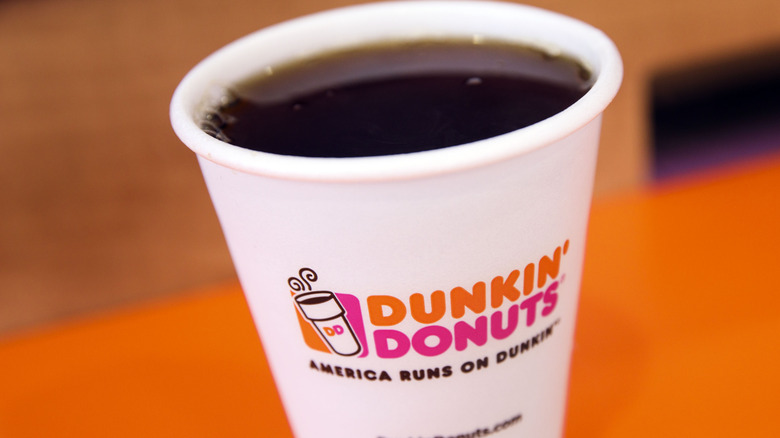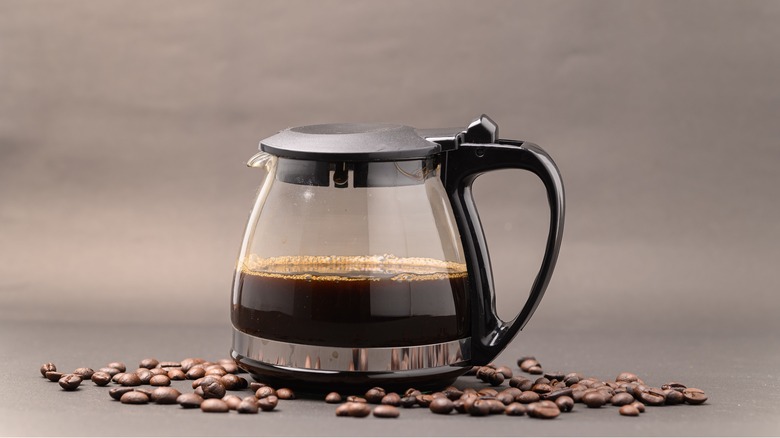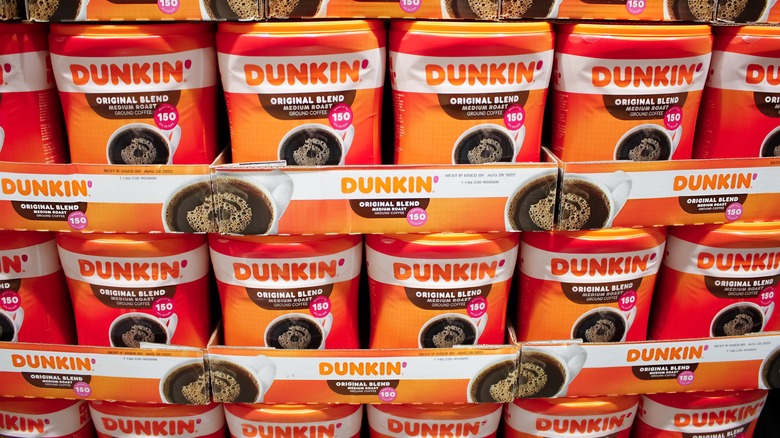The Rigorous Process Dunkin' Uses To Ensure Top-Notch Coffee
Dunkin' is one of the leading coffee chains in the country, right up there with Starbucks and Coffee Bean — and it didn't get to that spot by mere chance. Rather, it puts immense effort into making sure that its Dunkin' coffee is top-notch. One key tactic it has for making sure it's producing a quality product is to hire the right team of coffee tasters, to make sure that its blends taste great and always have the expected flavor.
Featured on the Dunkin' coffee team are two big-time coffee experts: The manager of Coffee Excellence is Jim Cleaves, and the International Coffee Expert in coffee tasting and analysis is Ellen Rogers, who also sits on the board of the Coffee Quality Institute. But the person who invented the company's system for testing was Hélène Marsot, a very important Dunkin' coffee taster.
In 2015, Marsot, spoke to The Boston Globe about the ins and outs of her work — which, if you're a coffee drinker, probably sounds like the dream job. She said, "For us to always end up with a consistent product, we have to control the quality from the tree to the cup. That's what I do."
It may be the ideal role, but it's also rigorous. In fact, the team tastes anywhere from 100 cups a week to 200 cups per day to make sure that the product is both consistent and tasty. And the process is more scientific than you may think.
There is a strict standardized system for coffee-tasting
Hélène Marsot was hired when Dunkin' was planning on expanding, so she thought a more standardized and scientific system was needed for the tasting process. Utilizing her degrees in food microbiology and sensory evaluation, Marsot came up with a system that scores coffee from one to seven for each of the following qualities: acidity, aroma, sweetness, finish, fragrance, body, and balance. If one is slightly off, then the order will be shipped back.
For tasting, many cups of coffee are sorted into groups, with each group brewed from different beans. Jim Cleaves and his team must ensure that the Dunkin' coffee taste remains the same, despite changes in beans. Considering that the company claims to sell 60 cups of coffee roughly every second, it has a lot of people to please.
The team must put personal preferences aside to judge the quality objectively — which may sound contradictory considering that it takes someone who loves coffee to do this job. Palmer Potter, the director of food and wine expe riential programs at Boston University, who also spoke to The Boston Globe, said that coffee tasting requires the same amount of skills as expert wine tasting. Part of the tasting process is to confirm that there are no unwanted moldy or medicinal flavors coming through. That's easy enough, but then they have to assess what the coffee taste offers — that's the subjective part.
Many factors go into creating a new blend
Part of the coffee team's job is to come up with new blends — which is just as complex a process as the tasting is. For example, they must look into the region that the beans are grown in, which often determines certain key flavor elements. In a 2021 interview for the Dunkin' blog, Ellen Rogers explained, "We look for what we call attributes in our coffee beans. These include acidity, body, sweetness, balance, and finish. For the Kenyan coffee beans in our new blend, the sweetness was a very particular factor we looked at because African coffees tend to have a higher fruity and citrusy sweetness to them."
Coffee creation processes have become more complex in recent years, with climate change affecting the production of coffee beans. Dunkin' has had to evaluate how each region is affected. If the temperature keeps climbing, the plantations need to move higher up into the mountains, where it's cooler, to get a good crop of coffee. This not only involves more labor, but the changing climate also affects the coffee flavors. There's certainly more to Dunkin' coffee than most of us will have considered. We may pay more attention next time we sip our caffeine hit.


